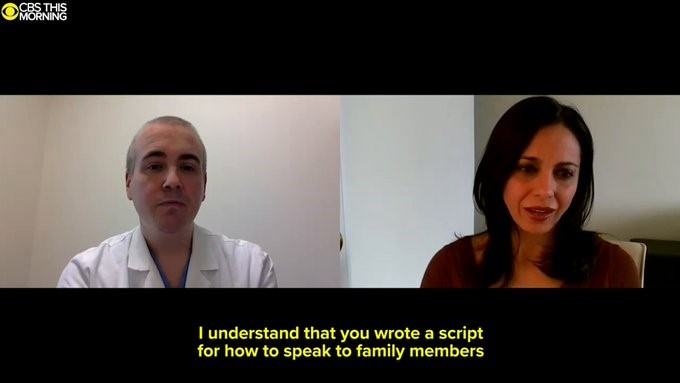Australian Journal of Nursing Research
Volume 2020; Issue 02
Mini Review Article
AHEAD: As the #Coronavirus Continues to Strain Hospitals, Healthcare Providers on the Frontlines May Face Some Impossible Choices About Who Gets Resources and Who Doesn’t
Benner P*
Department of Social and Behavioral Sciences, University of California, USA
*Corresponding author: Patricia Benner, Department of Social and Behavioral Sciences, University of California, USA
Citation: Benner P (2020) AHEAD: As the #Coronavirus Continues to Strain Hospitals, Healthcare Providers on the Frontlines May Face Some Impossible Choices About Who Gets Resources and Who Doesn’t. Aus J Nursing Res AJNR-100006
Received date: 17 May, 2020; Accepted date: 20 May, 2020; Published date: 28 May, 2020
I believe we need a national consensus and guidelines, but these must be informed by local discussions in ethics committees and clinician dialogues that are occurring in front-line care, as the crisis unfolds. The military has been dealing with mass casualties and limited medical resources extensively. Military writing on rationing is instructive. In the article, “The Dynamics and Ethics of Triage: Rationing Care in Hard Times” in Military Medicine in 2005, Maj. Thomas B. Repine and colleagues wrote.
Triage requires that a single person make rapid decisions of tremendous impact. These decisions cannot be made by committee to ensure fairness, because of the speed at which they are made. Triage done by a single person, unfortunately, is clearly open to criticism of bias and inequality[1]. To ensure that justice is being applied in these situations, oversight of the person performing triage must be instituted. Clinical guidelines are one approach to enforcing good ethical practice by a triaging physician. The Geneva Convention, for example, dictates that injured patients be triaged according to medical necessity, to the exclusion of nationality or even status as an ally or enemy. This can be quite difficult to explain to an American soldier watching as the insurgent who just killed one of his comrades is treated. Only by understanding the grander intent of the Geneva Convention can the soldier see why this is so important. Without clear, concise, explicit guidelines, triage is often perceived as inadequate and poorly organized by patients and the public. Guidelines for triage, however, do not supersede the judgment of the physician in triage situations[2-5].
The ultimate decision-making authority and subsequent responsibility always fall on an individual, who cannot be controlled from without but must be taught to follow ethical principle from within. It is impossible to guarantee justice through an external influence in any triage situation, but it can be ensured after the fact through appropriate review.
This view of triage acknowledges the exigencies of front-line care and advocates for review and improvement in ethical and clinical decision-making based upon front-line review and revision instead of providing an appeals process that may be too cumbersome during a surge of patients[6].
Many hospitals have already set up an appeals process for rationing decisions. Patrone and Resnik (2020) point out inherent limits and appeals processes because of the urgency, and surge demands that exceed health provider capacities during a time of crisis.
Existing pandemic preparedness plans should be developed to include ventilator specific guidelines and procedures. These should include measures aimed at improving surge capacity as well as at providing explicit guidance for implementing triage criteria and procedures. The adoption of clear, objective, and easily measurable clinical triage criteria in these plans helps to minimize potential injustices and errors, and reduces the need for individual physician judgment in triage decisions, thus further relieving pressures to include potentially dangerous appeals processes. Transparent and well-articulated national guidelines reflecting these suggestions should be proposed, and state and local legislation drafted to ensure protections for both patients and healthcare providers in case of disputes over particular decisions. Plans should adopt a competent and regular retrospective review of triage decisions and allow for revisions to triage protocol in light of those reviews. If these steps are taken, pandemic planning efforts can reasonably and ethically justify not including individual appeals processes and the potential problems threaten to create. These suggestions may hopefully help chart a way for discussions toward more actionable pandemic planning which is sensitive to the attractiveness of the idea of appeals processes in medical rationing policy, but which, at the same time, recognizes the potential dangers and difficulties that appeals processes pose under severe pandemic conditions for both patients and those who must care for them[7-12].
American society values individual autonomy and rights in health care. An appeals process is often used to enhance justice and provide a sense of entitlement in health care. However, a surge in demand may make it administratively impossible to meet the requirements of an appeals process. In that case, it becomes imperative that health care providers and hospital systems review, evaluate and improve clinical and ethical decision-making during an ongoing crisis. This accomplished, as events occur with institutional feedback and records kept towards a goal of continual improvement.
The goals are to fuel debate, discussion, and thinking about this unprecedented crisis in the U.S., where life and death rationing decisions may have to be made. The following questions are offered to start the discussion:
Critical Questions for Debate and Critique

Citation: Benner P (2020) AHEAD: As the #Coronavirus Continues to Strain Hospitals, Healthcare Providers on the Frontlines May Face Some Impossible Choices About Who Gets Resources and Who Doesn’t. Aus J Nursing Res AJNR-100006